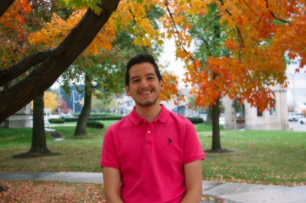Reyna: Consequences of online learning
April 23, 2021
We’re approaching the end of a tumultuous academic year. Week after week, we hopped onto Zoom for class, did our homework and attended virtual events organized by clubs across campus. As time progressed, we reached the burnt out phase where we retained limited information, class became more of a burden and we felt overwhelmed with everything on our plate taking a toll on our mental health.
The COVID-19 pandemic has not helped college students mentally. According to an interview study done by Texas A&M University, 89% of college students had difficulty concentrating, 82% had increased concerns on academic performance and 71% had indicated an increase in stress and anxiety due to the pandemic.
These are very troubling numbers and last semester, I truly felt those numbers. I definitely had difficulty concentrating as I was home and not on-campus. It was tough to be staring at a screen all day with no one around me to help ease the pain. I had increased concerns about my academic performance due to not having the usual in-person help from TAs, professors and friends. Finally, the pandemic brought me great stress due to my family owning a small business that required interaction with the public. I was scared that my family could’ve been infected while working. Top all of that off with school, and I was in a dark place. It didn’t help that it felt that we were given more work than usual and that our schedule last semester involved numerous weeks of school without rest.
I had hope for this semester. I thought the university would learn from last semester’s mistakes and be more accepting of students and understanding of extraneous circumstances, including that we are as busy outside of class as we are in class. My suspicions were made stronger yet by the Undergraduate Student Government survey results from the last semester that showed 58% of students experiencing an increase in workload compared to normal semesters. An Observer editorial last semester also expressed the exhaustion we were experiencing.
And yet, this semester turned out to be worse than the previous.
My anxiety increased. It felt like I was being given more work this semester compared to the last. I spent week after week working every day on classwork nonstop. I would wake up and almost immediately start on my homework. I had no free time for myself leading to a downward spiral of my mental health. I had to push away things that I loved doing such as reading and writing to focus only on my classes since the work didn’t stop no matter how much I chipped at it. The stress of the semester led me to start seeing Counseling Services and I have only recently been able to implement time for myself in my schedule.
It didn’t have to be this way. I had hope for our no-class days. However, they weren’t really days off, as I either had work due the day before or had an exam to study for the day after. Work wasn’t relieved, it was just delayed or accelerated. Is it really a rest day if there is still anxiety over impending work?
I know it is difficult to manage all of the chaos and work. I appreciate everything the university has tried to do for the best interest of the students. I know this is a challenging time for faculty and staff as well. Professors had to configure their classes and labs to try to be as effective as in-person. Some of them went above and beyond, and it does not go unnoticed. I appreciate being asked how I was doing by one of my professors when I arrived early to class. I appreciate professors who postponed work because they knew how tired we were and gave us words of encouragement. I appreciate it when professors send out feedback surveys to ensure we are feeling okay and make it easier for us to participate in class. The small things go a long way for my mental health.
I really hope the university learns what went wrong and what went well this academic year. There is one thing we may all agree on: we cannot do another academic year like this. It has taken too much of a toll on our mental well-being and drained us of the small joys of being in college. With vaccinations starting to ramp up, we can only hope that this will ensure that we will go back to normal during the 2021-2022 academic year. I, for one, cannot wait to be back in a normal classroom and not be staring at a screen all day.



